Essential oils can be used as natural insect repellents and to treat bug bites. This blog discusses some commonly used essential oils for this purpose.
Understanding Essential Oils as Mosquito Repellents
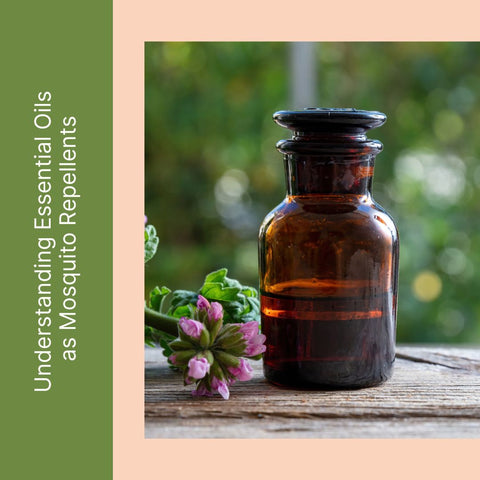
Essential oils have natural properties that make them effective mosquito repellents. Here's an explanation of how they function:
-
Some essential oils contain compounds that are known to repel mosquitos. These compounds may interfere with the insect's ability to locate their target using its sense of smell. For example, citronellal in citronella oil and eucalyptus oil can deter mosquitoes by masking their scent or making them unpleasant.
-
Essential oils are volatile, which means they readily evaporate at room temperature. When applied to the skin or dispersed in the air, the volatile compounds in essential oils form a barrier that mosquitoes may find difficult to penetrate, reducing the likelihood of bites.
-
Mosquitoes are drawn to humans due to the carbon dioxide we exhale, body heat, and body odour. Some essential oils, such as lavender and peppermint, have strong, pleasant scents that can help mask mosquito attractants, making it more difficult for them to find and bite us.
-
Essential oils can be used in a variety of ways to repel mosquitos. They can be applied topically to the skin (diluted with a carrier oil to prevent irritation), diffused to disperse the scent in indoor spaces, or even mixed into candles or lotions.
-
While essential oils can provide some protection against mosquitoes, their efficacy varies depending on concentration, frequency of application, and individual sensitivity. They may need to be reapplied more often than synthetic repellents.
It is worth noting that, while essential oils can be a natural and pleasant alternative to chemical mosquito repellents, their effectiveness may be inconsistent or short-lived. Before using any essential oil on a larger area of skin, always test a small amount on a small patch of skin to see if there are any adverse reactions.
The Science Behind Essential Oils in Repelling Mosquitoes
The science behind essential oils' ability to repel mosquitos includes several factors:
-
Chemical Composition: Essential oils are made up of a variety of volatile organic compounds (VOCs) extracted from plants. Some of these compounds have been shown to have mosquito-repellent properties. Examples of compounds that are known to keep mosquitoes away are citronellal, which is found in citronella oil, and eucalyptol, which is found in eucalyptus oil.
-
Olfactory Response: To find hosts for food, mosquitoes rely on their sense of smell. The presence of humans or animals can be difficult for mosquitoes to detect due to certain compounds in essential oils interfering with their olfactory receptors. It may discourage them from landing and biting due to this disturbance in their sensory perception.
-
Behavioural Response: In reaction to chemical cues in their surroundings, mosquitoes display particular behaviours. Essential oils have the potential to repel these behaviours. For example, the strong scent of essential oils such as lavender or peppermint may deter mosquitos from approaching areas where these scents are present.
-
Environmental Factors: Temperature, humidity, and air movement can all have an impact on essential oils' effectiveness as mosquito repellents. These factors can influence the volatility and dispersal of essential oil compounds, affecting their ability to repel mosquitos.
-
Individual Variability: Different mosquito species may react differently to essential oils, as may individual mosquitos within a species. Furthermore, the repellent effect can be modified by factors such as essential oil content, exposure length, and mosquito sensitivity.
While scientific studies have shown that certain essential oils repel mosquitos, it is important to note that their efficacy varies depending on a variety of factors. More research is needed to better understand the mechanisms of action and optimise their effectiveness as mosquito repellents.
Essential Oils vs. Chemical Insect Repellents: A Comparison
Essential oils and chemical insect repellents have different properties and benefits. Here is a comparison.
Essential Oils:
-
Essential oils are derived from plants and thus offer a natural alternative to synthetic chemical repellents. Many people prefer essential oils because of their perceived safety and environmental friendliness.
-
Essential oils degrade naturally in the environment, reducing their impact on ecosystems as opposed to synthetic chemicals, which can remain in the environment for longer periods of time.
-
Essential oils frequently have pleasant scents, making them more appealing to use, particularly for people who are sensitive to the strong odour of chemical repellents.
-
Essential oils typically offer shorter-duration protection than chemical repellents. They may need to be reapplied more frequently to remain effective.
-
The effectiveness of essential oils as repellents varies depending on concentration, formulation, individual sensitivity, and environmental conditions. Some essential oils may be more effective against certain types of mosquitos than others.
Chemical Insect Repellents:
-
Chemical insect repellents, such as DEET (N,N-diethyl-meta-toluamide) or picaridin, can provide longer-lasting protection with a single application than essential oils.
-
Synthetic chemical repellents have been extensively researched and proven effective against a wide variety of insects, including mosquitos, ticks, and flies. Health authorities frequently recommend them in areas where the disease is prevalent.
-
Chemical insect repellents are widely available in a variety of forms, including sprays, lotions, and wearable devices. They are also commonly found in commercial insect-repellent products.
-
Some people may develop skin irritation or allergic reactions to chemical insect repellents, particularly if they are used for an extended period of time. Certain chemical repellents should not be used on children under a certain age or while pregnant.
-
Some chemical insect repellents, such as DEET, have raised environmental concerns because they remain in waterways and may be toxic to aquatic organisms. Proper disposal and use according to label instructions can help to reduce these risks.
How Different Essential Oils Deter Mosquitoes
Different essential oils deter mosquitos through a variety of mechanisms, the most common of which is their chemical composition and scent. Here's how some commonly used essential oils repel mosquitos:
-
Citronella Oil: Citronella oil is a popular natural mosquito repellent. It contains citronellal and geraniol, which inhibit the mosquito's ability to detect human hosts by masking the scent of carbon dioxide and other attractants emitted by humans.
-
Lavender Oil: The beautiful flowery scent of lavender oil repels mosquitoes. It has substances with insect-repelling qualities, such as linalyl acetate and linalool. Furthermore, the anti-inflammatory qualities of lavender oil can help reduce mosquito bite pain.
-
Peppermint Oil: Mosquitoes are repelled by the potent, revitalising aroma of peppermint oil. It contains menthol and menthone, which mosquitoes dislike. The cooling sensation of peppermint oil also helps to relieve itching from bug bites.
-
Eucalyptus Oil: Eucalyptus oil has the ability to repel mosquitoes due to the presence of cineole, also known as eucalyptol. The strong, fresh scent of eucalyptus oil masks the scent of humans, making it difficult for mosquitos to find their victims.
-
Tea Tree Oil: Tea tree oil has antibacterial and anti-inflammatory properties that can help relieve insect bites. Its strong scent repels mosquitoes, discouraging them from landing and biting.
-
Cinnamon Oil: Cinnamon oil contains cinnamaldehyde, an insecticide. The scent of cinnamon oil is strong and can deter mosquitos from approaching areas where it is applied.
-
Lemon Eucalyptus Oil: Citronellal and citronellol, two compounds with mosquito-repelling qualities, are present in lemon eucalyptus oil. In certain studies, it has proven to be just as successful at keeping mosquitoes away as DEET.
Soothing Bug Bites with Essential Oils
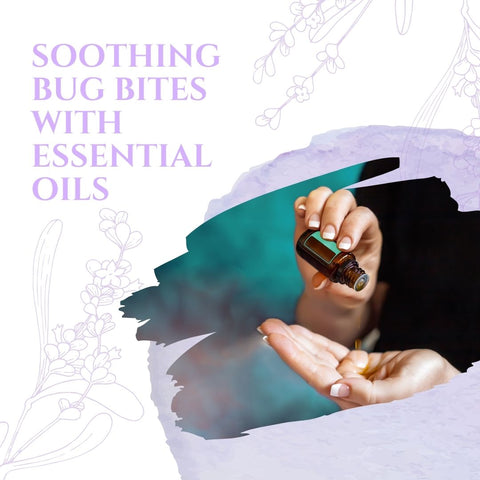
Essential oils have anti-inflammatory, analgesic, and cooling properties that can help with bug bites. Essential oils that can help soothe bug bites include lavender oil, tea tree oil, peppermint oil, chamomile oil, eucalyptus oil, and calendula oil. To avoid skin irritation, dilute essential oils with a carrier oil such as coconut oil or sweet almond oil before applying them to bug bites. The general rule is to use 1-2 drops of essential oil per teaspoon of carrier oil. You can apply the diluted essential oil blend to the affected area and gently massage it in. Reapply as needed for ongoing relief. If you have any adverse reactions, stop using it and seek medical attention.
The Healing Properties of Essential Oils for Bug Bite Relief
Essential oils have a variety of healing properties that can help with bug bites. Here's how they can help:
-
Many essential oils, such as lavender, chamomile, and tea tree oil, contain anti-inflammatory properties. They can help reduce the swelling, redness, and inflammation caused by bug bites, relieving discomfort.
-
Certain essential oils, such as peppermint and eucalyptus oil, have analgesic properties, which means they can help relieve the pain and discomfort associated with insect bites. They cause a cooling or numbing sensation that can temporarily relieve itching and soreness.
-
Tea tree oil is widely recognised for its antiseptic properties. By disinfecting the affected area, applying diluted tea tree oil to bug bites can help prevent infection and promote healing.
-
Essential oils with antipruritic properties, such as lavender and chamomile, can help soothe irritated skin and reduce itching. They have a soothing effect that reduces the desire to scratch bug bites, preventing infection and further irritation.
-
Certain essential oils, like helichrysum and calendula, can help heal wounds and insect bites. They accelerate the healing process by encouraging tissue repair and cell regeneration.
-
Tea tree oil, lavender, and eucalyptus are a few essential oils with antimicrobial properties that can help prevent infection and reduce the likelihood of problems from bug bites. Applying these oils to the affected area helps to keep it clean and germ-free.
Essential Oils for Itchy and Inflamed Insect Bites
Several essential oils contain anti-inflammatory, analgesic, and soothing properties that can alleviate itchy and inflamed insect bites. Here are a few essential oils to consider:
-
Lavender oil is known for its calming and anti-inflammatory properties. It can help to reduce inflammation, relieve itching, and promote healing. Lavender oil is skin-friendly and can be applied directly to insect bites after diluting with a carrier oil.
-
Tea tree oil has strong anti-inflammatory and antimicrobial properties, making it useful for reducing inflammation and preventing infection in insect bites. It can reduce itching and promote healing. However, to avoid skin irritation, tea tree oil should be diluted before application.
-
Peppermint oil has a cooling effect that can help relieve itching and discomfort caused by insect bites. It has analgesic properties that can help relieve pain. To provide relief, dilute peppermint oil with a carrier oil and apply it to the affected area.
-
Chamomile oil is soothing and anti-inflammatory, which can help calm irritated skin and reduce inflammation caused by insect bites. It can also reduce itching and promote healing. Chamomile oil is gentle and suitable for use on sensitive skin.
-
Eucalyptus oil contains compounds that have analgesic and anti-inflammatory properties, which can help relieve pain and swelling from insect bites. It has a cooling effect that can help alleviate itching. Dilute eucalyptus oil before applying it to your skin.
-
Helichrysum oil is well-known for its wound-healing properties and can aid in the regeneration of damaged skin caused by insect bites. It has anti-inflammatory and analgesic properties that can help relieve itching and inflammation.
To avoid skin irritation, essential oils for insect bites should be diluted with a carrier oil, such as coconut oil or almond oil. Before applying any essential oil to a larger area of skin, conduct a patch test to rule out sensitivity or allergic reactions. If you have any adverse reactions, stop using it and seek medical attention.
DIY Bug Bite Roll-Ons and Balms with Essential Oils
Making DIY bug bite roll-ons and balms with essential oils is a natural and effective way to relieve insect bites. Here are two simple recipes to try:
-
DIY Bug Bite Roll-On: Ingredients are 10 ml roller bottle, 5 drops lavender essential oil, 3 drops tea tree essential oil, 2 drops peppermint essential oil and Carrier oil (such as fractionated coconut oil or sweet almond oil). Clean and sterilize the roller bottle. Add the essential oils to the roller bottle, using a dropper. Fill the rest of the bottle with the carrier oil, leaving a small space at the top. Secure the roller ball and cap onto the bottle, and shake gently to mix the oils. To use, apply the roll-on directly to insect bites as needed, gently rolling it over the affected area. Avoid applying near the eyes or broken skin.
-
DIY Bug Bite Balm: Ingredients are 1/4 cup beeswax pellets, 1/4 cup coconut oil, 10 drops lavender essential oil, 5 drops tea tree essential oil and 5 drops chamomile essential oil. In a double boiler or heatproof bowl set over a pot of simmering water, melt the beeswax pellets and coconut oil together, stirring occasionally until fully melted. Once melted, remove the mixture from heat and allow it to cool slightly. Add the essential oils to the mixture and stir well to combine. Pour the mixture into small containers or lip balm tubes. Allow the balm to cool and solidify completely before using. To use, apply a small amount of the balm to insect bites as needed, gently massaging it into the skin until absorbed.
These DIY bug bite roll-ons and balms can provide relief from itching, inflammation, and discomfort associated with insect bites, thanks to the soothing properties of the essential oils. Keep them handy for quick and convenient relief whenever you're outdoors.
Creating Your Natural Mosquito Repellent Blend
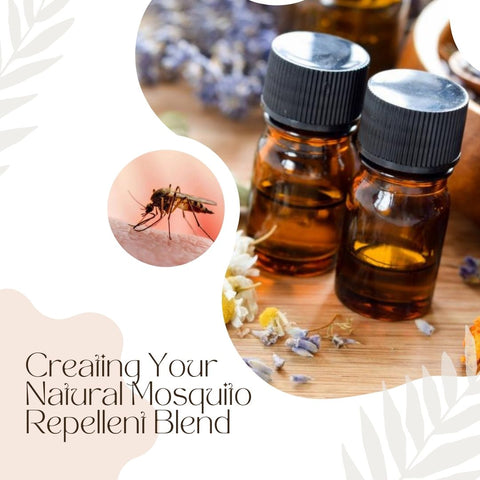
Creating your own natural mosquito repellent blend can be both beneficial and enjoyable. Here's a simple recipe that uses essential oils with mosquito-repelling properties:
DIY Natural Mosquito Repellent Blend: Ingredients are 10 ml glass spray bottle, 20 drops citronella essential oil, 10 drops lemon eucalyptus essential oil, 10 drops lavender essential oil, 5 drops peppermint essential oil, Distilled water or witch hazel and Optional: 1 teaspoon vegetable glycerin (to help the essential oils disperse in water). Clean and sterilize the glass spray bottle. Add the essential oils to the bottle, using a dropper. Adjust the number of drops based on your preferences and the bottle's size. If using vegetable glycerin, add it to the bottle. Fill the rest of the bottle with distilled water or witch hazel, leaving a small space at the top. Secure the spray nozzle onto the bottle and shake well to mix the oils with the water or witch hazel. Label the bottle with the contents and date.
Essential Oil Combinations for Maximum Mosquito Protection
To create a blend of essential oils for maximum mosquito protection, select oils with proven repellent properties and combine them in appropriate ratios. Here's a combination that includes some of the most effective essential oils for repelling mosquitos:
Maximum Mosquito Protection Blend: Ingredients are a 10 ml glass roller bottle or dropper bottle, 20 drops of citronella essential oil, 15 drops of lemon eucalyptus essential oil, 10 drops of lavender essential oil, 10 drops of peppermint essential oil, 5 drops of tea tree essential oil, and carrier oil (such as fractionated coconut oil or sweet almond oil). Clean and sterilize the glass roller bottle or dropper bottle. Add the essential oils to the bottle, using a dropper. Fill the rest of the bottle with the carrier oil, leaving a small space at the top. Secure the roller ball or dropper cap onto the bottle and shake gently to mix the oils. Label the bottle with the contents and date. To use, apply the blend to exposed skin, clothing, and outdoor areas where mosquitos breed, such as ankles, wrists, and necks. Reapply as needed, particularly after swimming or sweating.
Making Homemade Mosquito Spray with Essential Oils
Making homemade mosquito spray with essential oils is a natural and effective way to avoid mosquito bites. Here's an easy recipe to try:
Homemade Mosquito Spray with Essential Oils: 4 oz (120 ml) glass spray bottle, 2 oz (60 ml) witch hazel or vodka, 2 oz (60 ml) distilled water, 30-40 drops of mosquito-repellent essential oils (e.g., citronella, lemon eucalyptus, lavender, peppermint, tea tree), and optional 1 teaspoon vegetable glycerin (to help the essential oils disperse in water). Clean and sterilize the glass spray bottle. Pour the witch hazel or vodka into the bottle, using a funnel if necessary. Add the essential oils to the bottle, using a dropper. You can customize the blend by adjusting the number of drops of each oil based on your preferences. If you are using vegetable glycerin, add it to the bottle. Fill the rest of the bottle with distilled water, leaving a small space at the top. Secure the spray nozzle onto the bottle and shake well to mix the ingredients. Label the bottle with the contents and date. To use, shake the bottle thoroughly before each application and spray the repellent on exposed skin, clothing, and outdoor areas where mosquitos are present. Avoid spraying near the eyes and mucous membranes. Reapply as needed, particularly after swimming or sweating.
Tips for Safe Application of Essential Oil Bug Repellents
When using essential oil bug repellents, it is critical to follow safety guidelines to ensure an effective and safe application. Here are some tips for safely applying essential oils as bug repellents:
-
Dilution: Always dilute essential oils with a carrier oil before applying to your skin. Most essential oils are highly concentrated and, if not diluted, can cause skin irritation or sensitivity. A typical dilution ratio is one or two drops of essential oil per teaspoon of carrier oil.
-
Patch Test: Before applying any essential oil blend to a larger area of skin, conduct a patch test. Apply a small amount of the diluted blend to a small patch of skin (such as the inner forearm) and wait 24-48 hours to see if any redness, itching, or irritation develops.
-
Avoid Sensitive Areas: Do not use essential oil bug repellents near sensitive areas like the eyes, mouth, or mucous membranes. If applying to the face, spray or apply the repellent to your hands first, then gently pat it on the skin, avoiding contact with the eyes and lips.
-
Reapplication: Essential oil insect repellents may need to be reapplied more frequently than chemical repellents. Reapply the repellent every few hours or as directed on the product label, particularly if you are sweating profusely or swimming.
-
Do Not Ingest: Essential oils are only for external use and should not be consumed. Keep them out of reach of children and pets to prevent accidental ingestion.
-
Storage: Keep essential oils and repellent blends in dark glass bottles in a cool, dark location away from direct sunlight and heat. Proper storage helps to preserve the potency and effectiveness of the oils.
-
Pregnancy and Children: Certain essential oils may be unsafe to use during pregnancy or on young children. If you are pregnant, nursing, or plan to use essential oil bug repellents on children, consult a healthcare professional first.
-
Allergic Reactions: If you experience skin irritation, redness, or swelling after using essential oil bug repellents, stop using them. Wash the affected area with mild soap and water, and seek medical attention as needed.
-
Consult a Professional: If you have any underlying health conditions or are concerned about using essential oils as bug repellents, talk to a healthcare professional or aromatherapist first.
By following these guidelines, you can use essential oil bug repellents to protect yourself from insect bites in a safe and effective manner while reducing the risk of adverse reactions or irritation.
Essential Oils for a Bug-Free Outdoor Experience
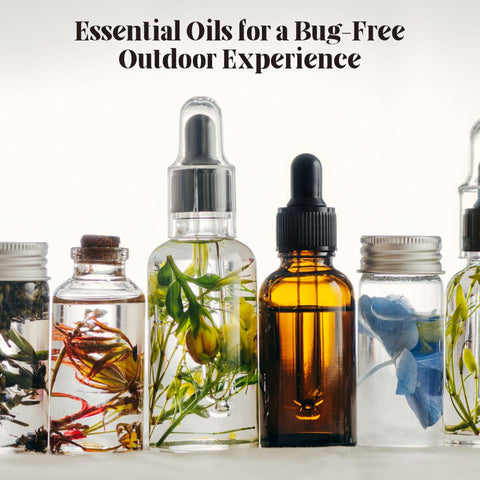
To ensure a bug-free outdoor experience, use essential oils with insect-repellent properties. Here are some essential oils you can include in your outdoor routine:
-
Citronella Oil: Citronella is perhaps the best-known natural insect repellent. Its strong, citrusy scent masks the attractants that entice mosquitos and other bugs, making it an effective deterrent.
-
Lemon Eucalyptus Oil: Lemon eucalyptus oil contains citronellal, a compound known to repel insects. The CDC recommends it as a more effective mosquito repellent than DEET.
-
Lavender Oil: Lavender has a pleasant aroma and is known for its calming effects. It can help repel mosquitoes and other insects while also creating a relaxing outdoor environment.
-
Peppermint Oil: Peppermint oil has a refreshing scent and contains menthol, which mosquitos dislike. It can help repel insects and provide a cooling sensation to the skin.
-
Tea Tree Oil: Tea tree oil has antimicrobial properties that can help repel insects while also soothing insect bites and irritations.
-
Eucalyptus Oil: Eucalyptus oil contains insect-repelling compounds such as citronellal and eucalyptol. It has a refreshing, invigorating scent that can help repel bugs.
-
Cedarwood Oil: This oil has a woody aroma that repels insects. It works especially well against mosquitoes, ticks, and fleas.
-
Geranium Oil: Geranium oil has insect-repellent properties and a floral scent that can help deter bugs while adding a pleasant fragrance to your outdoor area.
You can use these essential oils separately or make a unique blend by putting a few drops of each in a diffuser or diluting them with carrier oil before applying it to your skin or clothing. To naturally repel bugs, consider planting insect-repelling herbs such as citronella, lavender, and mint in your outdoor space.
Protecting Your Outdoor Spaces from Mosquitoes
To keep mosquitoes out of your outside spaces, use a combination of preventative measures and natural repellents. To keep mosquitoes at bay, remove standing water, use mosquito-repellent plants, install screens, use fans, avoid peak mosquito activity periods, use essential oil repellents, keep outdoor spaces clean, consider mosquito traps, and seek professional advice. Implementing these measures will allow you to create a more comfortable outdoor atmosphere while reducing mosquito prevalence and bite risk.
Using Aromatics to Keep Mosquitoes at Bay During Activities
Aromatics can be an effective tool for repelling mosquitoes during outdoor activities. Here's how to use them effectively:
-
Diffusers: Place mosquito-repelling oils such as citronella, lemon eucalyptus, or lavender around your outdoor activity area. The diffusers will disperse the aroma throughout the air, forming a natural barrier against mosquitos.
-
Aromatic Candles: Use candles infused with mosquito-repellent essential oils. Place them strategically around your outdoor space to form a perimeter of protection. Choose candles made from natural ingredients and essential oils over synthetic fragrances.
-
Herb Bundles: Combine aromatic herbs such as sage, rosemary, or lavender and burn them in a fire pit or outdoor fireplace. The smoke will deter mosquitos while also providing a pleasant fragrance to the air.
-
Aromatic Sprays: Make your own aromatic spray with a blend of essential oils known for their mosquito-repellent properties. Dilute the oils with water and witch hazel in a spray bottle, then mist yourself and your surroundings before and during outdoor activities.
-
Sachets or Pouches: Fill small muslin bags or pouches with dried aromatic herbs such as mint, lemon balm, or citronella. To create a personal mosquito barrier, place them in pockets, hang them from belts, or attach them to your clothing.
-
Natural Repellent Jewellery: Wear jewellery infused with mosquito-repellent essential oils, such as bracelets or necklaces made of lava beads or porous stones that can hold and release the aroma all day.
-
Fresh Herb Bouquets: Place fresh herb bouquets in vases or containers around your outdoor activity area, using mosquito-repelling herbs such as basil, mint, or lemongrass. The scent will help repel mosquitos while also adding a decorative element to your space.
-
Aromatic Potted Plants: Place mosquito-repelling herbs and flowers, such as citronella, lavender, or marigolds, near seating areas or entrances to your outdoor space. Crushing the leaves or flowers releases their aroma and increases their mosquito-repellent properties.
By incorporating these aromatic methods into your outdoor activities, you can create a comfortable and mosquito-free environment for yourself and your guests to enjoy.
Real Stories and Experiences with Essential Oil Mosquito Repellents
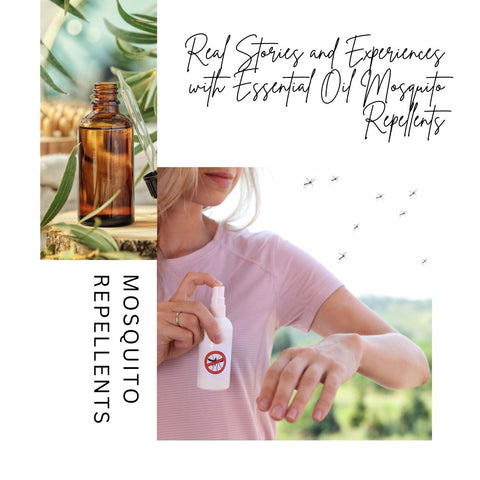
These real-life examples demonstrate the potential efficacy of essential oil insect repellents in a variety of outdoor locations and activities. While individual outcomes may vary, many individuals find that including essential oils in their outdoor routines helps reduce mosquito encounters and makes for a more comfortable outdoor experience.
















